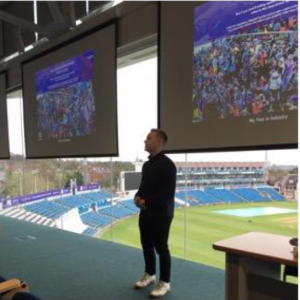
My Placement Year In The Sponsorship Industry
27th June, 2019
University is a platform for a higher earnings potential, but it certainly doesn’t guarantee it. With few real-world skills, more and more graduates are finding that 6 months to a year post graduation: they have yet to find a job in their preferred industry.
Naturally, this is an alarming reality for anyone attending university, but there is something that can be done to increase chances of employment: placement years. Placement years are a ‘sandwich’ option, allowing UK students to defer their final year in order to get a taste of the real world and in my case, a taste of sponsorship.
There are nearly 2 million undergraduates in the UK every year, I need to do something to stand out.
Away from the often-rigid restraints of university assignments – “this is the task, and this is how you must do it” – the real world is sometimes a stark contrast. There are a thousand ways to complete a job and often, there’s little instruction on how to do it, one must use their initiative. You know it. I know it. Employers know it. Hence, those with a strong employment history appeal more than a green undergraduate.
I deferred my final year. I applied for over 70 internships. I landed at Slingshot Sponsorship. A small yet renowned agency who weren’t even looking for a new team member but were willing to take me under their wing.
Working a year in an agency has been so highly advantageous to my career development, its hard to put into words (However I will attempt to for the remainder of this blog). I’ve learnt a lot: not just about the sponsorship industry, but about the workings of an agency, how to be malleable and more importantly how to balance multiple tasks, leads and clients at once: something university definitely doesn’t prepare you for.
One Key Thing I’ve learnt:
Learn. I have always been a keen learner. But having little experience within the industry and little experience in a 9-5: you really have to open your eyes and open your ears. Being able to be taught is an invaluable skill and it is essential to progressing in any career. Sponsorship is an ever-evolving landscape and coupled with working in a small agency – where job roles aren’t necessarily heavily defined – it’s crucial to adapt your skillset and learn new ones as quick as you can: if not, you’ll be left behind.
The top 3 favourite aspects of working in sponsorship:
- Insight. Working in a small agency has given me the opportunity to grow my knowledge beyond what I could have imagined 12 months ago. My role at Slingshot as been sales and yet: I’ve valued sponsorship properties, created proposals, liaised with clients, pitched global brands, managed social media accounts and taken care of the blogging. Additionally, our clients aren’t just sport. I’ve worked across all industries from B2B conferences to government initiatives to entertainment and live music, making me think on my toes and adapt my skillset on a daily basis. On top of this: my directors have even made me coffee. I doubt there’s many large agencies that give the same opportunities; I sure as hell wasn’t going to waste a year doing admin.
- Creating relationships.As mentioned, my main role at Slingshot has been sales, and I’ve enjoyed (nearly) every minute of it. Working in sales for 12 months has allowed me to build my contact base exponentially and create some great relationships along the way. Relationships are the key to the sponsorship industry (insert classic tale of the Manchester United/Chevrolet deal here) so to have been given the platform and guidance to make so many connections will prove to be extremely beneficial down the line.
- Working as a team. Coming from a team- sport background, working in a small team that co-operates and thrives has been one of the most enjoyable factors of my experience. Especially as there’s been no hierarchical malarkey: Slingshot is one of the most open and transparent workplaces I’ve experienced. I’ve really jelled with the team here and to say I’m going to miss it would be a BIG understatement.

Placement year has exceeded my expectations.
I truly never expected to have learnt so much in a relatively short space of time, and on top of that: didn’t expect to enjoy it half as much as I have. But most importantly I’ve given myself a head-start against my fellow graduates, the skills I’ve learnt will put me in best stead for sealing that all-important grad job and will certainly differentiate me for other candidates.
I cannot recommend a placement year enough.
Whilst university teaches you time management and a degree demonstrates your knowledge in a specialist field: neither provide you with a well-rounded skillset or real-world industry knowledge. Slingshot and my placement year have delivered on both accounts and given me a deep pool of industry contacts which are crucial for success in the sponsorship industry.
Now, just got to go and write that dissertation.

